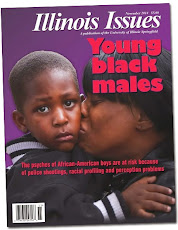Deanese Williams-Harris wrote the following post.
The results of a recent state employee ethics survey paint a gloomy picture of the environment in state offices. The survey, conducted by the Illinois Executive Ethics Commission, surveyed 402 random employees.
Employees reported ethical concerns with leadership roles and with how ethics investigations are carried out. As it stands, investigator general reports are not made public.
"Because the Ethics Act requires complete secrecy about investigation into wrongdoing, employees are not convinced that wrongdoers face any consequences," says Chad Fornoff, executive director of the commission.
Furthermore, an overwhelming majority report ethic rules weren't being fairly enforced, and many say they're uneasy about reporting unethical behavior. "The bad news is many employees believe agency ethics programs are ineffectual and fear retaliation if they report unethical activity," he says.
Eighty-seven percent of those surveyed identified one or more elements in the workplace that lend themselves to an unhealthy climate. More than 45 percent of employees say senior officials in their departments are less likely to be disciplined for wrongdoing than other employees.
Fornoff says the lack of trust reported by employees shows the need for transparency in the investigation and disciplinary process. "We believe that a pending bill that we have been supporting, SB157, will alleviate this problem." If approved, the measure would make public all alleged violations, the history of those violations and recommended disciplinary action against the state employees.
Natural Selection
A report released by the Illinois auditor general says the state Department of Natural Resources showed favoritism to certain hunters in issuing administratively approved hunting permits. The department also exceeded hunting quotas stipulated by Illinois law.
More than 1,200 permits were given out by administrative approval. The special permits benefited Illinois Conservation Foundation donors, professional athletes, judges, politicians and five representatives of an ammunition company.
The process allows hunters to bypass the hunting permit lottery system. However, the process wasn't open to the public. According to the report, fewer permits were available to Illinois hunters because of the number of special permits issued before and after the lottery process.
More than 90 percent of the applications for the special permits were incomplete, and fees weren't paid for more than 20 percent of the permits.
As a result, the department was asked to establish policies and procedures for issuing administratively approved permits. The department agreed to the recommendations.
For a quick synopsis of the violations, log on to the auditor general's findings.
Subscribe to:
Post Comments (Atom)





No comments:
Post a Comment